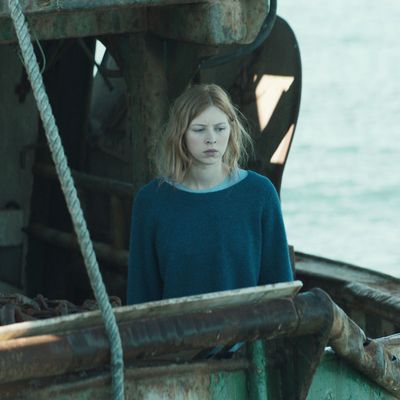
“Fishermen don’t swim,” a young scientist named Siobhán (Hermione Corfield) is told in Sea Fever on her first day aboard the weathered but sturdy Irish fishing trawler Niamh Cinn Óir. “’Cause it’s better to go fast. Nobody wants to drown slow.” I have no idea if this is actually true — I suspect it’s not — but it’s a testament to writer-director Neasa Hardiman’s ear for authenticity and eye for detail that, in the moment, I totally bought the idea. In its rough outlines, Sea Fever isn’t all that different from any number of unspeakable-menace-at-sea horror flicks, but unlike so many other genre movies, it has a fully realized, lived-in quality: You can smell the oil, sweat, and salt, and hear the grind of motors and murmur of sailors.
When we first see Siobhán, she’s in a lab analyzing an organism while her colleagues have birthday cake in an adjoining room. She’s a standard-issue introvert, shy and focused on her work, and her sojourn on the Niamh Cinn Óir — on which she hopes to study “anomalies” in the daily seafood catch — offers yet more opportunities for alienation and awkwardness: The gruff, chummy crew, led by skipper Gerard (Dougray Scott) and his wife, Freya (Connie Nielsen), doesn’t know what to make of this nerdy young stranger. Siobhán has scientific and behavioral explanations for things they appreciate as mysteries and myths. Plus, she’s a redhead, and apparently redheads are bad luck on ships.
But Hardiman doesn’t overdo the conflict. She uses it to shape and deepen her characters, as when Siobhán and Freya observe the sea one night glowing blue: Siobhán, in thrall to the beauty of science, identifies it as bioluminescent phytoplankton, while Freya, embracing the mystery of myth, prefers to think of it as the glowing hair of the Irish legend Niamh Cinn Óir, after which her boat is named. It’s not an impasse, or even a debate, but rather an acknowledgement that the world is bigger and stranger than either of them.
They have no idea. Soon enough, the boat sails into forbidden waters and strikes … something. Weird little circles develop along the walls, secreting a bluish ooze. Diving into the water because she’s the only one who can scuba, Siobhán witnesses a disturbing sight: The hull is covered in long, thin, glowing tendrils — or are they tentacles? — that reach all the way down beyond where the eye can see, seemingly belonging to an ominous deep-sea creature. But the problem, the crew soon realizes, isn’t the tendrils; it’s the parasitic larvae contained in the blue ooze that infect you and make you act weirdly before, well, killing you.
This is the point at which Sea Fever may become eerily familiar to an audience newly obsessed with the anxious mechanics of real-life infection and exposure in confined spaces. I won’t lie: Small chills went up my spine whenever the characters started talking about quarantine and how long to wait before knowing someone exposed might be safe.
It’s easy to overstate such echoes, however. The movie works not because it was unwittingly released during a pandemic — though it may gain extra viewers because of that circumstance, seeing as it’s a small indie title that has gone straight to on demand while bigger movies scurry off the release schedule — but because Hardiman steers clear from spectacle, cheap thrills, and jump scares. Instead, she wisely builds suspense from uncertainty as our heroes are terrorized not by loud noises and gore but by the agonizing solitude of the open sea and a nemesis that is practically invisible. They also grieve in ways that characters in horror are rarely allowed to, which adds to the film’s excruciating authenticity. Sea Fever teases out elemental anxieties that have been given fresh life by unfortunate reality, but the movie is worth seeing because, when all’s said and done, it gives us characters and circumstances we can care about.





